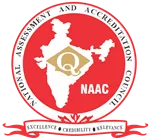- About Us
- Admission
- Academics
- Examination
- IQAC
- Research
- IIC
- Placements
- Student Support
- Anti - Ragging
- Citizenship Training
- Counselling
- Equal Opportunity Centre
- Mentorship
- Mid day Meal Scheme
- Scholarship
- Sexual Harassment (Prevention and Redressal)
- CQAC and SQAC
- Students Welfare
- Capability Enhancement and Development Schemes
- Assessing Learning Levels
- International Desk
- Student Grievance Redressal Committee SGRC
- St. Joseph's Boys Hostel - Apply
- Outreach
- Student Activities
- Infrastructure
- Sports
- Alumni Activities
GRIEVANCES REDRESSAL & MALPRACTICES
Any grievance regarding exam procedures can be referred to the exam grievance committee, which will look in to the matter and decide upon.
1. Any type of grievance that the student might have pertaining to other students, management, staff, infrastructure, CIA, examinations, etc., must first be discussed with the concerned teacher/Class Mentor/Controller of Examinations. As far as possible, the problem should be resolved at this level.
2. Matters that are not resolved at the classroom level must be brought to the notice of the Grievance Committee.
a) The grievance must be stated in writing.
b) It must be forwarded to the Coordinator of the Grievance Committee through the Class Mentor or any other Staff member.
c) The Grievance Committee will meet at least three times in a year, twice after publication of end semester results (June & December). Depending upon the urgency of the situation, short meetings could be called for.
d) The Grievance Committee can invite the Student Counsellor, Member of the PTA or any other Staff member, to join the meeting, depending on the nature of the grievance.
e) The Grievance Committee will meet and discuss the matter. The decision of the Committee will be communicated to the Principal and the concerned parties, through the coordinator of the Grievance Committee.
f) All malpractices in the examination and internal assessment will be referred to the Malpractice Committee. The Committee will provide a fair chance to the students accused of malpractice and finally submit their findings to the Principal. The Principal and Controller of Examinations will take action on the report of the Committee.
All students’ malpractices in the Examination and Internal assessment will be referred to the Exam Malpractice Committee of the College set up for the purpose. Few senior staff members of the College will be its members. They would provide a fair chance to the students involved in malpractice and finally submit their findings to the CoE and the Principal of the College. A committee consisting of the Principal, Controller of Examinations and the Heads of the Departments will take action jointly on the report of the committee.
The following are considered as some of the Malpractices:
•Cheating
Attempting to use or using unauthorized material or information as study aids in any academic exercise. Visually or verbally receiving or giving information during the test or examinations
•Counterfeit Work
Includes work turned in, as one’s own that was created, researched, or produced by someone else. Turning in a report of another’s research, submitting a paper researched or written by someone else, having someone else take a test, and submitting joint projects as solely one’s own, are all forms of counterfeit work and are unacceptable.
•Falsification of Academic Records
Knowingly and improperly changing grades on transcripts, grade sheets, electronic data sheets, related documents, academic reports, tests, and projects is an act of academic dishonesty.
•Falsification of Data or Creation of False Data
It is considered an act of academic dishonesty in research or experimental procedures.
•Plagiarism
It includes presenting as one’s work the work of someone else without properly acknowledging the source. Plagiarism is using sentences and ideas of another person as if they were one’s own. Exact copying should be enclosed in quotation marks and be appropriately documented in footnotes or endnotes that indicate the source of the quotation. Paraphrasing, when the basic sentence structure, phraseology and unique language remain the same, is also plagiarism. When in doubt about these matters, it is the student’s responsibility to seek guidance from the lecturer of the course.
•Unauthorized reuse of work
Turning in the same work to more than one class without consent of the lecturers involved, constitutes academic dishonesty.
1. Room Invigilator gives a written report to the CoE.
2. Investigation is taken up by the CoE.
3. The student gives a written explanation to the CoE in the report.
4. Decisions are taken based on the Recommendations of the Examination Malpractice Committee.
| Sl.No. | Nature of Malpractice | Disciplinary Action |
|---|---|---|
| 1 | Possession of copying material | Annulment of the performance of the student at the college examination in full in addition to the punishment prescribed there at. |
| 2 | Actual copying from the copying material | Annulment of the performance of the student at the college examination in full in addition to the punishment prescribed there at. |
| 3 | Possession of another student’s answer book. | Exclusion of the student from examination for one additional examination (BOTH THE STUDENTS). |
| 4 | Possession of another student’s answer book + actual evidence of copying there from. | Exclusion of the student from College examination for two additional examinations (BOTH THE STUDENTS). |
| 5 | Mutual/Mass copying | Exclusion of the student from College examination for two additional examinations. |
| 6 | (i) Smuggling-out or smuggling –in of answer book as copying material (ii) Smuggling-in of written answer book based on the question paper set at the examination (iii) Smuggling-in of written answer book and forging signature of the invigilator thereon. |
Exclusion of the student from College examination for two additional examinations. Exclusion of the student from College examination for two additional examinations. Exclusion of the student from College examination for four additional examinations. |
| 7 | Attempt to forge the signature of the invigilator on the answer book or supplement | Exclusion of the student from College examination for four additional examinations. |
| 8 | Interfering with or counterfeiting of College seal, or answer books or office stationery used in the examinations. | Exclusion of the student from College examination for four additional examinations. |
| 9 | Answer book main or supplement written outside the examination hall or any other insertion in answer book | Exclusion of the student from College examination for four additional examinations. |
| 10 | Insertion of currency notes/ to bribe or attempting to bribe any of the person/s connected with the conduct of examinations | Exclusion of the student from College examination for four additional examinations. |
| 11 | Using obscene language/ violence, threat at the examination centre by a student at the College examination to Jr./Sr. Supervisors | Exclusion of the student from College examination for four additional examinations. |
| 12 | (a) Impersonation at the College examination | Exclusion of the student from College examination for four additional examinations.(Both the students if impersonator is the student of College). |
| 13 | Revealing identity in any form in the answer written or in any other part of the answer book by the student at the College examination | Annulment of the performance of the Student at the University or College or Institution examination in full. |
| 14 | Found having written on palms or on the body, or on the clothes while in the examination | Annulment of the performance of the Student at the College examination in full. |
| 15 | All other malpractices not covered in the aforesaid categories | Annulment of the performance of the Student at the College examination in full and severe punishment depending upon the gravity of the offence. |



.webp)
.webp)
.webp)
.webp)
